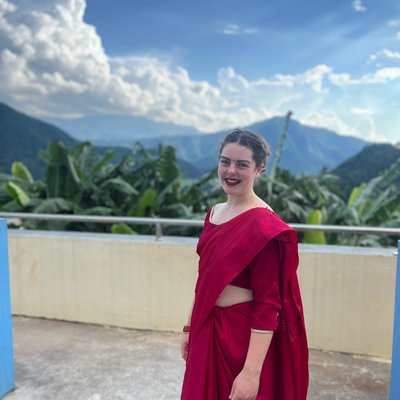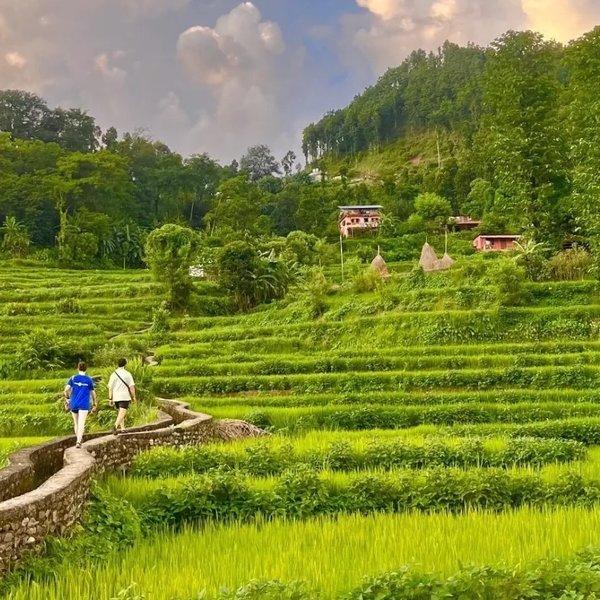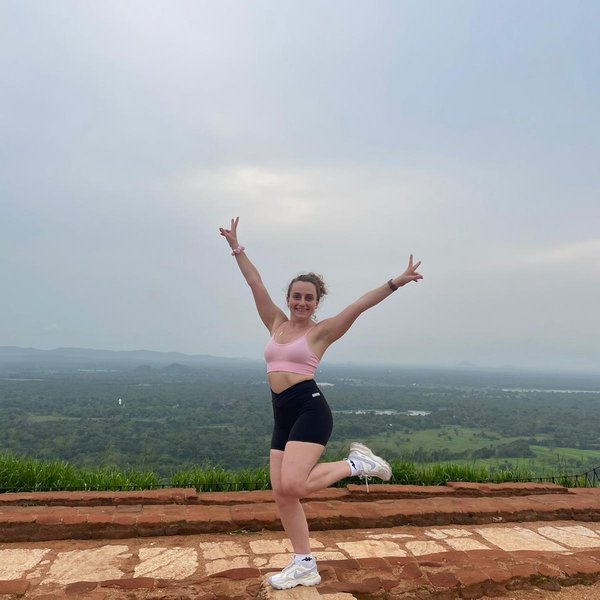Cardiff University 2024
I wanted to experience the juggle of practising my profession and travel, which I was, and I am even more interested in doing once I graduate from Cardiff University.
Spending five weeks in Nepal, four in the capital, Kathmandu, and one at a remote village was the perfect opportunity to explore healthcare, life and culture in a different country.
 Walking into the physiotherapy department at the hospital reflected the chaos of Kathmandu itself.
Walking into the physiotherapy department at the hospital reflected the chaos of Kathmandu itself.
It was rather busy, with little privacy. It was so interesting to see new equipment alongside old equipment, often donated by universities and hospitals worldwide, including some from the UK. Much of this equipment is no longer used in physiotherapy in the UK.
I thought I would get really tired and overwhelmed at how much was going on and could not quite fathom how the physiotherapists here were seeing around 20 patients each per day. This is compared to a maximum of 10 patients that a physiotherapist in an outpatient setting like this back at home.
Physiotherapy on the wards was a different world. Having been on the wards more than in outpatient settings, I could better compare the differences.
There was something new around every corner, from the smells to the incredible reuse of resources, such as a catheter bag used as a water bottle.
Families could pay for individual rooms with air conditioning rather than being in a noisy, hot room of sometimes 15 beds, all full. It made me feel incredibly lucky for the hospitals and services provided in the UK.
I now have greater knowledge of a diverse range of cases and conditions which may not have been as common in the UK.
I have developed practical skills, including treatment methods such as ultrasound and TENS, which are still used in the UK, particularly TENS.
My ability to describe or demonstrate exercises or certain positions has improved; thinking on my feet to get the patient to do a certain movement has helped improve my problem-solving skills.
Physiotherapy is quite a 'hands-on' role — I did not need to spend all my time speaking and explaining things to patients who probably couldn’t understand what I was saying. Most of the time, I could move their limbs to the correct position for them so they knew what I meant.
One of my favourite cases I was involved in was providing daily continuation exercises for a young patient with ACL repair.
The physiotherapist I was with was a sports and orthopaedic specialist, and it was super fun at the start when we were all doing the exercises together. It was so rewarding to put a smile on the patient's face!
Another interesting case I observed in outpatients was a 6-month-old baby with torticollis. It was lovely how the physiotherapist interacted with the child, and with next to no experience in paediatric physiotherapy, I could only imagine the challenge of this case, particularly for the child's parents.
 A lot of the physiotherapy practice followed similar guidelines to what is used in the UK, with exercise becoming the most important treatment due to evidence. However, there were big differences in privacy and person/patient-centred care.
A lot of the physiotherapy practice followed similar guidelines to what is used in the UK, with exercise becoming the most important treatment due to evidence. However, there were big differences in privacy and person/patient-centred care.
The outpatient department had side cabins with two beds, and there were up to four patients in there with the doors open so patients sat outside the cabins could see in. Also, some treatments, such as traction and a tilt table for Guillian Barre Syndrome, would be in plain sight of the benches where patients would be waiting.
This meant that it was also busy, and there was a lack of space for treatment. For example, a patient with an ACL injury was doing dynamic jumps across the room, weaving in and out of people.
In the evenings, we went out into Thamel to explore the nightlife. We went to some fun clubs and nice bars. It was a nice change to spend time with people from the house outside of a placement setting.
On some evenings after placement, we visited temples and attended festivals. There was so much to do.
I think one of the most memorable for me was walking up the many steps to the Monkey Temple and having an amazing view of the city as a reward or the Kopan Monastery, which was so peaceful and quiet, a complete contrast to the hustle and bustle of the city. Watching the festivals in Thamel was also incredible, with people parading around playing instruments, etc.
I went to Chitwan for a safari one weekend. On another weekend, I went to Pokhara to go paragliding and visit culturally significant places.
If you want to challenge yourself and build your confidence for travelling or living with other lifestyles and cultures, then an overseas placement is for you.
If you’re worried about the people you will meet, know that Nepalese people are extremely friendly. You will also be living in a house with a group of other healthcare students from all over the world — you are going there for a similar purpose and will always have that in common!
It's such an eye-opening experience.

Start Your Journey
Want to go on your own once-in-a-lifetime adventure? Get started below:
Want to go on your own once-in-a-lifetime adventure? Get started below:

%20Thumbnail%20Image.png)





